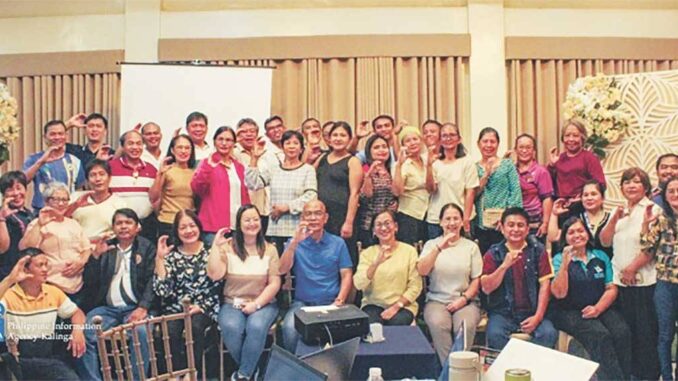
THE Cordillera Cacao Industry Development Council (CCIDC) wants to get recognized and represented in the regional agri-fishery and development council to gain support for its initiatives.
This, as the CCIDC held its third-quarter meeting in Tabuk, Kalinga, bringing together cacao farmers, growers, processors, entrepreneurs, government agencies and other stakeholders from across the region to discuss strategies and actions to advance the industry.
Part of the discussion was on enhancing the visibility and advocacy for the industry with the council agreeing to work on getting recognized by the Regional Agricultural and Fishery Council (RAFC) and being included in the Regional Development Council (RDC) to gain more government support and assistance.
Members and officials of the Cordillera Cacao Industry Development Council pose for a group photo during their third-quarter meeting in Tabuk City, Kalinga, in early October. PIA PHOTO
“We should get recognized at the RAFC so during the meeting of the RDC, we will be included. I really want to attend their meeting so we will get recognized in the RDC, so they will also learn about our activities,” said CCIDC Chairman Eva Ritchelle Padua.
The council also agreed to incorporate the cacao industry in the local development plans of local government units to help establish the commodity as a key component of local economic growth.
The council also decided on the creation of an association to serve as a unifying body of cacao-based micro, small and medium enterprises.
Composed purely of stakeholders from the private sector, the Cordillera Cacao Industry Association will seek enrollment as a chapter of the Philippine Cacao Industry Association in order to gain access to valuable resources, training and networking opportunities for the development of the sector.
The CCIDC third-quarter meeting was attended by cacao focal persons and technicians from the local government units and representatives from concerned government agencies including the Department of Agriculture, Department of Environment and Natural Resources, Department of Trade and Industry (DTI), Department of Science and Technology, Bureau of Plant Industry, Technical Education and Skills Development Authority, Department of Agrarian Reform, among others.
Earlier, they turned over a cacao shared service facility (SSF) Program in Luna, Apayao, in support of the development of the cacao industry at the regional grassroots.
Wena Buston, DTI Apayao provincial director, led the launching of the SSF for cacao processing valued at P1.3 million with the Golden Cacao Farmers Association in Barangay Zumigui as cooperators.
Buston said the newly awarded equipment is designed to be shared with other cacao processors in the community for the development of the cacao industry in the grassroots. She said the SSF is a program of the DTI aimed at improving the productivity and efficiency of MSMEs through a more advanced technology by providing machinery, tools, systems, accessories and other auxiliary items under a shared system.
For his part, Local Economic Development and Investment Promotion officer Philip Uba said that the cacao industry is among the top priority industries in the province and is supported by the provincial government of Apayao.


Be the first to comment